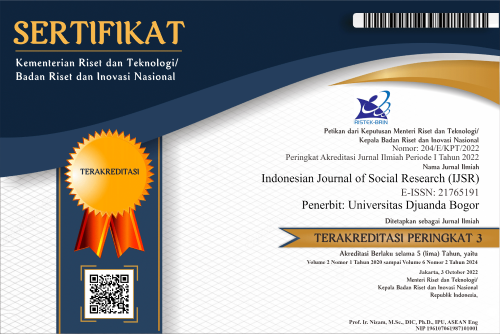Analysis of Employee Organizational Commitment: Using Four Independent Variables
Abstract
This research focuses on exploring effective efficiency in employee treatment by examining organizational commitment influenced by organizational culture and compensation, with performance and satisfaction serving as mediators. The research location was conducted at an accommodation service in Lampung with a population of 80 employees. Data collection used a saturated sampling technique for 77 employees who wanted to contribute to filling in statements related to this research. SEM-PLS is employed to uncover direct and indirect effects, yielding the following findings: Performance is directly impacted by organizational culture and compensation. Organizational commitment, however, is not directly affected by either organizational culture or compensation. On the other hand, job satisfaction is directly influenced by organizational culture and compensation. Furthermore, organizational commitment is directly influenced by performance rather than job satisfaction. Regarding indirect influence, performance variables and job satisfaction have no significant effect, so the two exogenous variables, namely organizational culture and compensation, can directly influence organizational commitment without going through performance or job satisfaction variables
References
Alkadash, T., & Alamarin, F. (2021). An Integrative Conceptual Framework On Employee Performance During Covid-19 Pandemic For Bahrain SMEs. Psychology and Education, 58(2), 3812–3817. https://doi.org/https://doi.org/10.17762/pae.v58i2.2644
Andriansyah, M. A., Sudiro, A., & Juwita, A. J. H. (2023). Employee performance as mediated by organisational commitment between transactional leadership and role ambiguity. International Journal of Research in Business and Social Science (2147- 4478), 12(5), 139–150. https://doi.org/10.20525/ijrbs.v12i5.2669
Budiono, A. (2022). Employee performance analysis of Paul Bakery Restaurant in Jakarta during the COVID-19 pandemic by measuring leadership, motivation and compensation through job satisfaction. Turyzm/Tourism, 32(1), 141–157. https://doi.org/10.18778/0867-5856.32.1.07
Budiono, A. (2023). Dasar-Dasar Manajemen Sumber Daya Manusia (Pendekatan Lingkungan Organisasi) (A. Sofatunisa (ed.); 1st ed.). CV. Mega Press Nusantara. https://sip.asaindo.ac.id/assets/repository/E-Book_MSDM_2023.pdf
Budiono, A. (2024). Organisational Commitment Influenced by Motivation and Training with Job Satisfaction and Performance as Mediator. MAMEN (Jurnal Manajemen), 3(1), 16–32. https://doi.org/https://doi.org/10.55123/mamen.v3i1.2836
Cherif, F. (2020). The role of human resource management practices and employee job satisfaction in predicting organizational commitment in Saudi Arabian banking sector. International Journal of Sociology and Social Policy, 40(7), 529–541. https://doi.org/10.1108/IJSSP-10-2019-0216
Chin, W. W. (1998). The partial least squares approach to structural equation modeling. Modern methods for business research. Statistical Strategies for Small Sample Research, January 1998, 295-336. http://books.google.com.sg/books?hl=en&lr=&id=EDZ5AgAAQBAJ&oi=fnd&pg=PA295&dq=chin+1998+PLS&ots=47qB7ro0np&sig=rihQBibvT6S-Lsj1H9txe9dX6Zk#v=onepage&q&f=false
Dessler, G. (2013). Human resource management (S. Holle (ed.); 13th ed.). Prentice Hall.
Eliyana, A., Ma’arif, S., & Muzakki. (2019). Job satisfaction and organizational commitment effect in the transformational leadership towards employee performance. European Research on Management and Business Economics, 25(3), 144–150. https://doi.org/10.1016/j.iedeen.2019.05.001
Fahmy, Z. N., & Priyono, B. S. (2023). Compensation And Job Characteristics Affect Organizational Commitment With Work Environment Moderation. Jurnal Ilmiah, Manajemen Sumber Daya Manusia, 6(3), 585–593. http://openjournal.unpam.ac.id/index.php/JJSDM/article/view/29875
Hair, J. F., Ringle, C. M., & Sarstedt, M. (2011). PLS-SEM: Indeed a silver bullet. Journal of Marketing Theory and Practice, 19(2), 139–152. https://doi.org/10.2753/MTP1069-6679190202
Hassan, Z. (2022). Employee retention through effective human resource management practices in Maldives: Mediation effects of compensation and rewards system. Journal of Entrepreneurship, Management and Innovation, 18(2), 137–173. https://doi.org/10.7341/20221825
Hendri, M. I. (2019). The mediation effect of job satisfaction and organizational commitment on the organizational learning effect of the employee performance. International Journal of Productivity and Performance Management, 68(7), 1208–1234. https://doi.org/10.1108/IJPPM-05-2018-0174
Hilimi, Z., Kindangen, P., & Susita, D. (2020). The Effect of Empowerment , Training , Compensation through Organizational Commitment on the Performance of the Financial Management of the North Sulawesi Provincial Government. International Journal of Human Capital Management, 4(2), 1–10. https://journal.unj.ac.id/unj/index.php/ijhcm/article/view/14308
Indradewa, R., & Randi, S. (2021). The Effects of Competence and Motivation on Performance Mediated by Organization Commitment (Case Study Indonesian Government Agencies). International Journal of Research and Review, 8(1), 77–89. https://doi.org/10.52403/ijrr.20210110
Indripriarko, G., & Aima, M. H. (2022). Effect of Work Environment and Compensation on Employee Performance with Job Satisfaction as a Mediation Variable. Journal Research of Social Science, Economics, and Management, 2(02), 134–148. https://doi.org/10.59141/jrssem.v2i02.249
Kooij, D. T. A. M. (2020). The impact of the Covid-19 pandemic on older workers: The role of self-regulation and organizations. Work, Aging and Retirement, 6(4). https://doi.org/10.1093/workar/waaa018
Korda, B. B., & Rachmawati, R. (2022). Influence of Organizational Culture on Employee Performance Mediated by Job Satisfaction and Employee Commitment. Jurnal Organisasi Dan Manajemen, 18(2), 57–73. https://doi.org/10.33830/jom.v18i2.3706.2022
Kuswati, Y. (2020). The Effect of Motivation on Employee Performance. Budapest International Research and Critics Institute (BIRCI-Journal): Humanities and Social Sciences, 3(2), 995–1002. https://doi.org/10.33258/birci.v3i2.928
Laras, T., Jatmiko, B., Susanti, F. E., & Susiati. (2021). The Effect of Work Environment and Compensation on Work Motivation and Performance: A Case Study in Indonesia. Journal of Asian Finance, Economics and Business, 8(5), 1065–1077. https://doi.org/10.13106/jafeb.2021.vol8.no5.1065
Lolowang, N. L., Troena, E. A., Djazuli, A., & Aisjah, S. (2019). The effect of leadership and organizational culture on employee performance that is educated by motivation (study on the implementation empowerment programs in Jayapura city). Problems and Perspectives in Management, 17(1), 268–277. https://doi.org/10.21511/ppm.17(1).2019.23
Luthans, F. (2011). Organizational Behavior. In B. Gordon (Ed.), Organizational Behavior (12th ed.). McGraw-Hill.
Mahmood, S., Hamid, K. bin A., & Badlishah, S. bin. (2021). The Effect of Human Resource Management Practices on Employee Performance. Turkish Journal of Computer and Mathematics Education, 12(3), 2900–2911. https://doi.org/https://doi.org/10.17762/turcomat.v12i3.1321
Meyer, J. P., & Allen, N. J. (1991). A three-component conceptualization of organizational commitment. Human Resource Management Review, 1(1), 61–89. https://doi.org/10.1016/1053-4822(91)90011-Z
Muhson, A. (2022). Analisis Statistik Dengan SmartPLS: Path Analusis, Confirmatory Factor Analysis, & Structural equation Modeling. Program Pasca Sarjana Universitas Negeri Yogyakarta.
Nauman, S., Bhatti, S., Jalil, F., & Bint E Riaz, M. (2021). How training at work influences employees’ job satisfaction: roles of affective commitment and job performance. International Journal of Training Research, 19(1), 61–76. https://doi.org/10.1080/14480220.2020.1864444
Nurdiansyah, R., Mariam, S., Ameido, M. A., & Ramli, A. H. (2020). Work Motivation, Job Satisfaction and Employee Performance. Business and Entrepreneurial Review, 20(2), 153. https://doi.org/10.25105/ber.v20i2.8006
Nurjanah, S., Pebianti, V., & Handaru, A. W. (2020). The influence of transformational leadership, job satisfaction, and organizational commitments on Organizational Citizenship Behavior (OCB) in the inspectorate general of the Ministry of Education and Culture. Cogent Business and Management, 7(1). https://doi.org/10.1080/23311975.2020.1793521
Paais, M., & Pattiruhu, J. R. (2020). Effect of Motivation, Leadership, and Organizational Culture on Satisfaction and Employee Performance. Journal of Asian Finance, Economics and Business, 7(8). https://doi.org/10.13106/JAFEB.2020.VOL7.NO8.577
Pamungkas, B. C., Brahmasari, I. A., & Ratih, I. A. B. (2023). The Effect Of Transformational Leadership, Organizational Culture, And Management Control System On Employee Performance With Organizational Commitment As The Intervening Variable At CV Makmur Jaya Abadi Surabaya City. Journal of Economics, Finance and Management Studies, 06(01), 429–437. https://doi.org/10.47191/jefms/v6-i1-48
Pawirosumarto, S., Sarjana, P. K., & Gunawan, R. (2017). The effect of work environment, leadership style, and organizational culture towards job satisfaction and its implication towards employee performance in Parador hotels and resorts, Indonesia. International Journal of Law and Management, 59(6), 1337–1358. https://doi.org/10.1108/IJLMA-10-2016-0085
Pradhan, R. K., Dash, S., & Jena, L. K. (2019). Do HR Practices Influence Job Satisfaction? Examining the Mediating Role of Employee Engagement in Indian Public Sector Undertakings. Global Business Review, 20(1), 119–132. https://doi.org/10.1177/0972150917713895
Ramadhany, S. R., Taba, M. I., & Umar, F. (2020). The Effect of Training and Job Satisfaction on Employee Engagement and Performance of Millennial Generation Employees of PT Midi Utama Indonesia Tbk in Makassar. International Journal of Innovative Science and Research Technology, 5(6), 566–571. https://doi.org/10.38124/ijisrt20jun288
Riadi, E. (2018). Statistik SEM dengan LISREL (E. Kurnia (ed.); 1st ed.).
Ridha, M., Najamuddin, M. N., Semmaila, B., & Mursalim. (2020). The Mediating Role of Job Satisfaction in the Development of Officer’s Performance. European Journal of Business and Management Research, 5(5), 1–7. https://doi.org/http://dx.doi.org/10.24018/ejbmr.2020.5.5.518
Robbins, S. P., & Judge, T. A. (2013). Organizational Behavior (L. Paoli (ed.); 15th ed.). Edinburgh Gate Harlow, Pearson.
Robbins, S. P., Judge, T. A., & Breward, K. E. (2016). Essentials of Organizational Behavior Canadian Edition (C. O’Donnell (ed.); Canadian E). Pearson.
Rosalia, P. D., Mintarti, S., & Heksarini, A. (2020). The Effect of Compensation and Motivation on Job Satisfaction and Employee Performance at SMK Medika Samarinda. Saudi Journal of Business and Management Studies, 5(7), 448–454. https://doi.org/10.36348/sjbms.2020.v05i07.009
Seema, Choudhary, V., & Saini, G. (2021). Effect of Job Satisfaction on Moonlighting Intentions: Mediating Effect of Organizational Commitment. European Research on Management and Business Economics, 27(1), 100137. https://doi.org/10.1016/j.iedeen.2020.100137
Segura-Camacho, A., García-Orozco, J. J., & Topa, G. (2018). Sustainable and healthy organizations promote employee well-being: The moderating role of selection, optimization, and compensation strategies. Sustainability (Switzerland), 10(10). https://doi.org/10.3390/su10103411
Setiawan, H., Herawati, Y., Alhadi, E., Sayuti, A. J., Bustan, J., & Desiana, L. (2023). Model of Job Satisfaction and Organizational Commitment. Asean International Journal of Business, 2(1), 35–48. https://journal.adpebi.com/index.php/AIJB/article/view/445
Silitonga, P., & Budiono, A. (2020). Merumuskan Budaya Organisasi dan Peraturan Perusahaan (R. Indra (ed.); 1st ed.). ANDI.
Simamora, H. (2004). Manajemen Sumber Daya Manusia (3rd ed.). STIE YPKN.
Soomro, B. A., & Shah, N. (2019). Determining the impact of entrepreneurial orientation and organizational culture on job satisfaction, organizational commitment, and employee’s performance. South Asian Journal of Business Studies, 8(3), 266–282. https://doi.org/10.1108/SAJBS-12-2018-0142
Sumiati, S. (2021). The Role Of Motivation As Mediation In Improving Employee Performance In The Government Of Surabaya City, East Java. Jurnal Manajemen Dan Kewirausahaan, 23(1), 52–60. https://doi.org/10.9744/jmk.23.1.52-60
Tahar, A., & Sofyani, H. (2020). Budgetary Participation , Compensation , and Performance of Local Government Working Unit : The Intervening Role of Organizational Commitment. Journal of Accounting and Investment, 21(1). https://doi.org/10.18196/jai.2101142
Tan, R., & Antonio, F. (2022). New insights on employee adaptive performance during the COVID-19 pandemic: Empirical evidence from Indonesia. Journal of Entrepreneurship, Management and Innovation, 18(2), 175–206. https://doi.org/10.7341/20221826
Winarsih, T., & Fariz, F. (2021). The Effect of Job Satisfaction on Organizational Commitment and Work Discipline. Budapest International Research and Critics Institute (BIRCI-Journal): Humanities and Social Sciences, 4(1), 1328–1339. https://doi.org/10.33258/birci.v4i1.1759
Wirawan. (2015). Evaluasi Kinerja Sumber Daya Manusia (L. Alfiah (ed.); 1st ed.). Salemba empat.
Wolor, C. W., Supriyati, Y., & Purwana, D. (2019). The effect of work stress, compensation and motivation on the performance of sales people. International Journal of Innovation, Creativity and Change, 9(5), 252–269.
Copyright (c) 2024 Indonesian Journal of Social Research (IJSR)

This work is licensed under a Creative Commons Attribution-ShareAlike 4.0 International License.
The Authors submitting a manuscript do so on the understanding that if accepted for publication, copyright publishing of the article shall be assigned/transferred to Indonesian Journal of Social Research (IJSR) Universitas Djuanda as Publisher of the journal. Upon acceptance of an article, authors will be asked to complete a 'Copyright Transfer Agreement'. An e-mail will be sent to the corresponding author confirming receipt of the manuscript together with a 'Copyright Transfer Agreement' form by online version of this agreement.
Indonesian Journal of Social Research (IJSR) Universitas Djuanda, the Editors and the Editorial Board make every effort to ensure that no wrong or misleading data, opinions or statements be published in the journal. In any way, the contents of the articles and advertisements published in the Indonesian Journal of Social Research (IJSR) Universitas Djuanda are sole and exclusive responsibility of their respective authors and advertisers.
Remember, even though we ask for a transfer of copyright, our journal authors retain (or are granted back) significant scholarly rights as mention before.
The Copyright Transfer Agreement (CTA) Form can be downloaded here: Copyright Transfer Agreement-IJSR 2020
The copyright form should be signed electronically and send to the Editorial Office e-mail below:
Dr. Rasmitadila, M.Pd (Editor-in-Chief)
Universitas Djuanda
Jl. Tol Jagorawi No.1, Ciawi, Kec. Ciawi, Bogor, Jawa Barat 16720
Website: http://journal.unida.ac.id/index.php/IJSR/index
Email: ijsr@unida.ac.id





4.png)



